Kirby Larson's Blog, page 25
November 27, 2013
Wednesday Wisdom
No good thing is pleasant to possess without friends to share it.
Seneca
Happy Thanksgiving!
Seneca
Happy Thanksgiving!
Published on November 27, 2013 05:30
November 26, 2013
From the Office of the Future of Reading
Please join me in welcoming today's guest blogger, Michelle Glatt. Michelle has been the librarian at Chiddix Junior High School in Normal, Illinois for 17 years and is a member of the Rebecca Caudill Young Reader’s Book Award Steering Committee. Her family of wild readers includes her husband, Dan, and children: Veronica (17) and Ian (11). Michelle has a blog, I Push Books: A Middle School Librarian’s Adventures in Reading, and is also on Twitter and Facebook.

Wild about School and Public Library CollaborationFor the past few weeks I have been happily devouring Donalyn Miller’s new book, Reading in the Wild. She refers to lifelong readers as “wild readers,” a term I love because it implies both a fierce dedication to reading and the freedom of reading on one’s own. I am a school librarian because I am a wild reader, and my mission is to help create more of my own kind. Each day, my priorities are to provide an atmosphere that encourages wild reading, to promote books to wild readers of all species, and to support teachers growing wild readers in their classrooms.By definition, a wild reader’s territory is not limited to the school building. Wild readers thrive when they connect to reading wherever they are. So my involvement in their reading must go beyond our walls. To that end, an excellent way to help cultivate wild readers is to connect them to their local public libraries and librarians.For ten years, the teen librarians at the Bloomington and Normal libraries have visited my school once a month for Books and Bites. Students sign up to eat lunch in the library, get a treat, and listen to us booktalk. Books and Bites is so well-loved that students run to the clipboard when sign-up begins, and I must turn some of them away because there is just not enough room in the library.Each Books and Bites has a theme. October is always scary stories. How can we resist starting booktalks like this: “Do you want to hear about the scariest, grossest, and most disgustingly gory book in the library?” (The Monstrumologist by Rick Yancey). One of my favorite themes was “Lend Me Your Ears!” when we played songs to go with music-themed books and used The Sex Pistols’ “Anarchy in the UK” with Gordon Korman’s Born to Rock. The teen librarians always bring titles that are not available in my library, especially edgier ones for the eighth graders, in order to entice students to stop in to see them.
Each Books and Bites starts with “commercials” for upcoming programs at the public libraries. It’s the best way for students to find about Game Day, Teen Advisory Board, book-movie release parties, etc. Promoting the summer reading programs is a must in May, and many students participate. At the Normal Public Library’s hugely successful Doctor Who program this summer, a mad rush of current and former students greeted me at the door. Pretty wild, huh?
Time has shown that collaboration with the teen librarians is one of the best ways to help turn my students into wild readers. A couple of days ago the four girls in my reading intervention group lamented that Books and Bites was full. “We get to sign up early next time because we are in your class, right?” they cleverly asked. One piped up, “Hey, or you should take us on a field trip to the Normal library—it’s not too far to walk. They have different books there--and more of them. I bet we could pick out some really good ones.” “Yeah, let’s go,” the others chimed. “That’s a great idea! I will see if we can do that,” I replied. On the inside, I was shouting for joy--because now I know that they are on their way to becoming wild readers. And the wilder they become the better readers they will become. Oh, yes, we are definitely going on safari to the public library. Let the wild rumpus start!
Thank you Michelle for helping to create wild readers!
Published on November 26, 2013 05:30
November 21, 2013
From the Office of the Future of Reading
Please join me in welcoming today's guest blogger, Holly Mueller. Holly is a 5th/6th grade ELA gifted intervention specialist with a wonderful husband who understands her O.B.B.D. (Obsessive Book Buying Disorder), and two talented, amazing daughters. Holly loves to read, write, teach, travel, and hang out with friends and family. Holly's family have a hilarious Cocker Spaniel, Ben, who keeps her laughing and encourages her to take lots of walks. Holly is a Choice Literacy contributor and frequent blogger. You can find her on Twitter and her blog, Reading, Teaching, Learning.

PARENT/STUDENT BOOK CLUBS

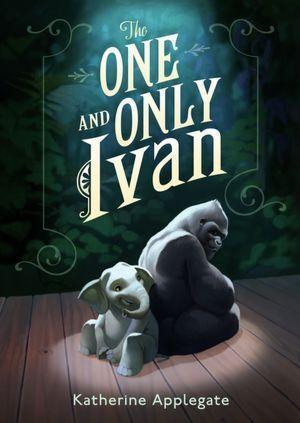
I knew when I read two special books to my classes last year, I wanted the experience to be something the kids would never forget. I knew the books alone would take care of that, but I wanted to take it further. I invited parents along for the sense of community it would create.
The first book was Wonder by R.J. Palacio. By now, every teacher has heard of this amazing book. I read it aloud as our first book of the year and to accompany our unit on empathy. At my fall orientation, I invited the parents to read along with us, and had gathered ten extra copies from our award-winning Cincinnati Public Library (they are wonderful about compiling multiple copies of books for classroom use). The copies were all quickly snatched up; parents then signed up on a waiting list.
By the time I was done reading the book aloud, all the parents who wanted to join us had read it. Throughout the experience, parents sent me e-mails about how they reacted to the book. I loved thinking about my students and their families talking about Wonder around kitchen tables and counters, in the car running to practices, and in family rooms. Even siblings got in on the reading. I keep a classroom blog, and when I would post questions and student discussions on it, parents would join in on the conversations in the comments. To culminate the experience, we held a Parent/Student book club gathering on a weekday evening at my school. I prepared discussion questions, showed a couple of interview videos with R.J. Palacio, and then we talked and talked. It was amazing to hear the interaction and see the enthusiasm the book created.

It was such a great experience; I knew I wanted to do it again when we started the 2013 Newbery Award winner The One and Only Ivan by Katherine Applegate. Again, I gathered multiple copies for parents, and they were all eager to join us in the reading, but how could we top the first experience? A student helped me with that! Olivia and I were talking, and she was telling me about a new baby gorilla at The Cincinnati Zoo. As we chatted about his circumstances and how cute he was, it suddenly dawned on me where the perfect place for our next Parent/Student Book Club meeting should be – the zoo!! We planned the outing in the spring, and it turned out to be a beautiful, sunny day. We met at the entrance where amazing tulips in every color bloomed. Whole families came! I had scheduled stops at the Elephant Encounter to honor Stella and Ruby and the Gorilla Encounter to celebrate Ivan, of course. We learned all about those incredible animals from the excellent zoo staff and thought one gorilla looked an awful lot like Ivan!
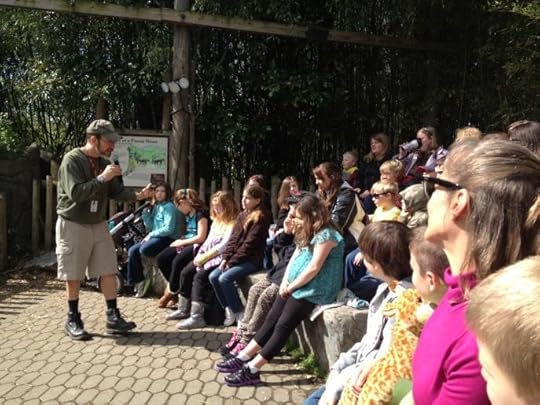
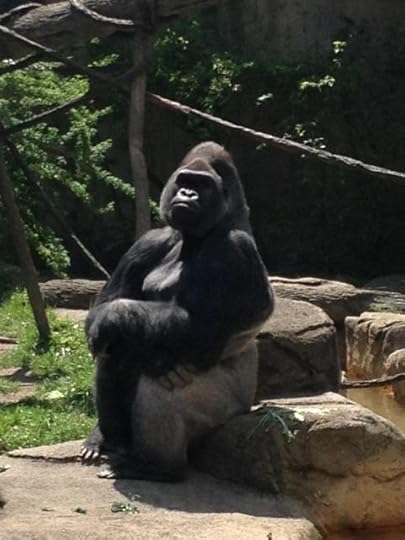
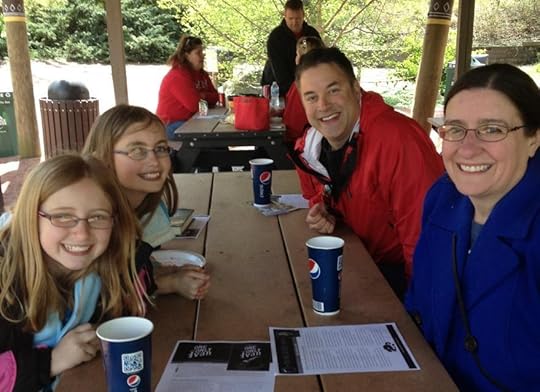
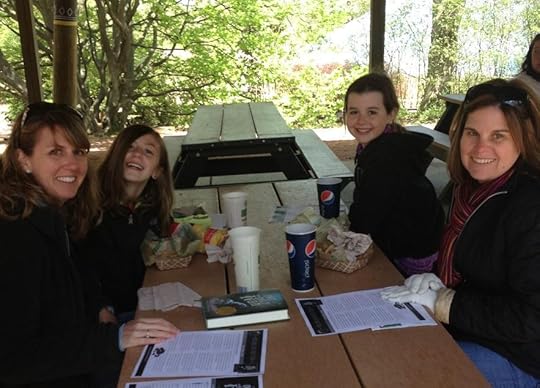
When we ate lunch, I distributed discussion questions about the book to each table and floated around, listening to the wonderful conversations this book inspired.
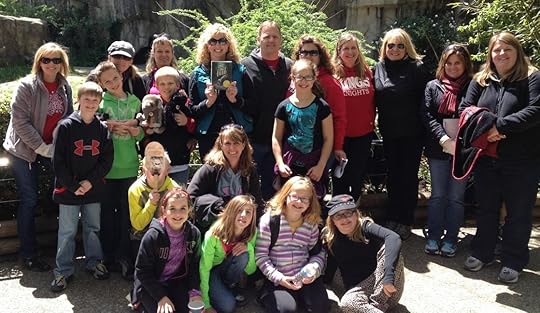
It was quite a day, and one that I know I’ll never forget. I hope my students and their families feel the same way!
I got chills, too, Holly, thinking about your families all talking about the same book. What a fabulous idea! Thank you so much for sharing.
Published on November 21, 2013 05:30
November 20, 2013
Wednesday Wisdom
It takes a long time to grow an old friend.
John Leonard
John Leonard
Published on November 20, 2013 05:30
November 19, 2013
From the Office of the Future of Reading
Please join me in welcoming today's guest blogger, Paul W. Hankins. Paul teaches English 11 and AP English Language and Composition at Silver Creek High School. He lives in Floyds Knobs, Indiana with his wife, Kristie, their two children, Noah (13) and Maddie (11). Paul is a Wonder Lead with The National Center for Families Learning and an active member of many professional organizations. You can find him at Facebook and Twitter.
 Paul and a friend
Paul and a friend
Why, This Book. . .
It's an honor to be able to write to you from Kirby Larson's blog today. Wow. Wait a minute. I am writing a blog. And Kirby Larson is sharing said blog. I'm tempted to think that this is as good as it gets.But I know better.
Because I read.
Books.
In a recent conversation with a mentor and friend about wonder and the condition of wonder, I thought about a prompt that might sound like "Why I Wonder. . ." And then I thought about those games we used to play in school where one might put the emphasis upon different words within a sentence thereby changing the meaning of that sentence.
I think this works here. And I would like to explore the idea with you today as we explore the future of books.
WHY, This Book:
It's an exclamation that begins a narrative wherein a reader tells you about that one book they read within that one moment in time. It was the one they held and found that the book held them too. If the reader had the book in his or her hand while speaking these words, you might seem them open the book and place it page-side in against their chest like an armor plate against anything that might come for their heart.
Books do this. Their permanency comes from their invitation to readers to open them as much as their innate ability to open readers to worlds, to ways, to wonder.
And if you were to ask them when they knew--beyond a shadow of a doubt--that they were, in fact, a reader, they would respond, "Why. . .this book. . ."
Why THIS Book:
Now, this is the reader with that book in hand.
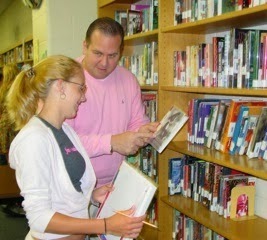
It's been taken off of the shelf with a friend in mind.
It's been taken out of a book bag during a lunch date as an impromptu gift between friends. The kind of gift both would expect from the other. It never fails. Whenever they meet, they have a book to share with the other. And always the story of how they found it, what they found within it, and what the book found within them.
We are always losing our cherished books to the hands of the friend who has now found them. Because it is THIS book. This author. This title. THIS book makes us so thankful to the people who came before who taught us to read.
But who taught us to share? THIS book. Somewhere in the margins we readers find ourselves in the fold. We read from left to right and down. But when there are no pages left, if never feels right to just put a book down. So we pass it on.
THIS book.
You're going to love it.
Why This BOOK:
Because it is the one gift that you can give used but arrives in the hands of the reader who has not read the book new.
The future of books is found within our continuing to share them. The book from the shelf into the hands of a friend is to look at ourself by way of the story we are sharing. Readers share books as a means of leaving something of themselves as a reader in that room. We know when our reader-friends see that book upon the counter, upon the ottoman, or upon the bedside table they are seeing us from the other side of the cover.
Hand-to-hand. Reader to reader. The future of books.
The sharing of stories from the circle about the fire to the fingers wrapped around the newest release. We continue to gather in small groups for the sharing of stories. We are still warmed by these exchanges.
Why this book. . .
Because the stories we share become the quiet chuckle at a passing reference. The stories we share become our port within the storm when the book becomes buoy. The stories we share are pages become pact.
Thank you, Paul. My mind is whirring with the possibilities you've stirred up here. As a writer, the notion of "pages become pact" is the guiding tenet of my revision efforts. Love thinking about it from a reader's perspective!
Published on November 19, 2013 05:30
November 14, 2013
From the Office of the Future of Reading
Please help me welcome today's guest blogger, Kelly D. Vorhis, a high school English teacher at NorthWood High School in Nappanee, Indiana. She teaches tenth grade English, Advanced Composition and Creative Writing, and is an Academic Team Coach for the Spell Bowl and English teams. She has been blessed to be able to work with up and coming young writers, which fuels her passion for writing Young Adult literature and hones her editing skills. One of her passions in life is reading and literacy, and she strives to get just the right book into the hands of each of her students. A proud member of the Nerdy Book Club, Kelly loves connecting with other teachers and authors on social media. At this time, she is busy grading essays and working on a Young Adult novel set in the Old West with a touch of Steampunk added for fun. Look for her on Twitter and Facebook.
How I spread my love of books to staff/colleagues and parents:
I am one of those lifelong readers who always has a book in her hand. Books are simply an extension of me and who I am, so it should be no surprise that I focus on getting books into my students’ hands on a daily basis. Every year my classroom library grows; and this year, more than ever before, I find colleagues wandering into my room to browse the shelves, because a student we have in common mentioned a book that they “must read.”
The aspect that is unique in my classroom and building is the daily talk about the book we’re reading, whether it is the spontaneous outburst from a reluctant reader who for the first time ever, stayed up way too late the night before finishing a book, which leads five other students to start asking questions and wanting to read it next, to connections made between Julius Caesar and the best-selling list book another student is reading.
Before I continue, I must give credit to Book Love and Penny Kittle. Her book has changed the way I incorporate Independent Reading in my classes. No longer are my students required to complete Reading Logs that sap their enthusiasm for reading. I’m still tweaking the way Independent Reading works in my classroom, and recent student surveys indicate that it is working.
Encouraging students to read often leads to parents becoming more involved with reading at home. Many times books leave with students and aren’t returned for weeks, simply because parents are intrigued by the fact that their child who formerly did not like reading has suddenly started reading. They want to know why and what has prompted the change. Students return with messages from parents stating they loved the book, could I provide more?
It is a challenge to spread the “Book Love” (as I call my campaign to get everyone in my building reading more). A strategy that I use daily is to make sure I carry a book, cover out, whenever I leave my classroom. I try to incorporate the title into whatever conversation I’m having at the moment, whether I’m talking to a student, chatting with one of the administrators, or hanging out in the surge (common area) between classes. I also ask colleagues what book they’re currently reading. If they aren’t reading, I often recommend one or two titles or offer to find them something I think they’d like. Colleagues have been stopping by to ask about books their students are reading, or to ask my opinion about books for their children.
Sharing your love of books and modeling that to everyone around you on a daily basis is a sure fire way to encourage colleagues, students, and parents to read and read more widely.
Thank you Kelly for being an excellent role model at sharing your "Book Love."
Published on November 14, 2013 05:30
November 13, 2013
Wednesday Wisdom
Dreams come true; without that possibility, nature would not incite us to have them.
John Updike
John Updike
Published on November 13, 2013 05:30
November 12, 2013
From the Office of the Future of Reading
Please join me in welcoming today's guest blogger, Karen Terlecky. Karen is a fifth grade language arts teacher at Glacier Ridge Elementary in Dublin, Ohio. Karen co-authors the blog, Literate Lives, and is a contributor for the Choice Literacy website.
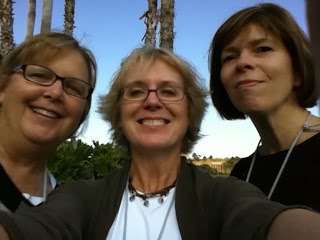 Karen Terlecky, Barbara O'Connor and Kirby Larson; photo lifted from Barbara's blog
Karen Terlecky, Barbara O'Connor and Kirby Larson; photo lifted from Barbara's blog
It is Sunday morning, and I’m sitting at my kitchen table, wrapped up in my comfy robe, feet in my warm and fluffy slippers, headband holding my hair back, and not a lick of makeup on my face. These are all signals to me that it’s time to chat with my students about books and their reading lives.
My students write reading response letters to me every other week. We fondly call them Mrs. T letters in our class, but they are far more than just letters to me. They are really letters to the community of readers in our classroom, where we begin conversations in our letters and then continue those conversations in our comments. We are able to have these quality discussions by using the KidBlog website, where students post their letters and comments.
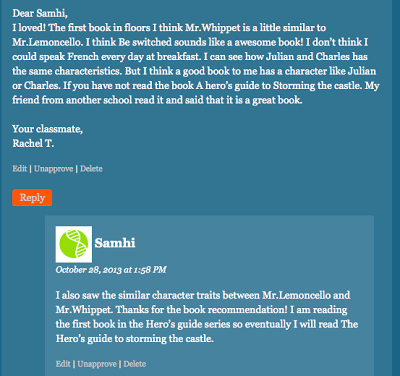
There are many reading standards that we as teachers are required to cover, but all of those standards pale in comparison to helping children develop true reading lives.
Our Mrs. T letters help us grow as readers. The letters are focused on reactions, thoughts, opinions, and feelings about different parts of each student’s reading life. One student could share about a recent trip she made to the public library and the pile of books she brought home. Another student might share his observations and feelings about our current read aloud. Yet another might share about a favorite character, series, or book, and explain why she loves it so much. But all students are thinking deeply about reading and what it means to them.
The community piece of this is important as well. We start writing these letters after we’ve established a community of readers in our classroom; we have built trust and we know each other’s likes and dislikes when it comes to reading. Our Mrs. T letters just help accentuate and fine tune where we are as readers at any given point in time.
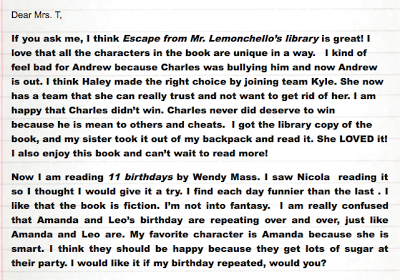
Then, when we add the next layer of thinking with our comments, it enriches the lives of all readers. There are threads of conversations that begin to appear, just as in other social media. Recently, several students wanted to read Out of My Mind, and through the conversation on KidBlog, decided to form their own book club. Another student was struggling for a book to read; he just couldn’t settle on one that held his interest for long. When he sent an appeal for recommendations out in his letter, the response was overwhelming. He then had a wide variety of books from which to choose, and he settled on a series that was very popular with his classmates, Myth-o-Mania.
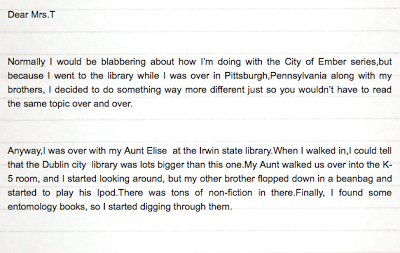
The weekend mornings I spend perusing the Mrs. T letters and comments are absolutely delicious. For a few hours, I spend time getting to know my readers better personally, and I make sure that I leave a meaningful comment for each reader. I want them to know that we are all members of this club of readers, of which I am a member as well.
Thank you Karen for sharing such a wonderful way to take reading to the next level for kids.
 Karen Terlecky, Barbara O'Connor and Kirby Larson; photo lifted from Barbara's blog
Karen Terlecky, Barbara O'Connor and Kirby Larson; photo lifted from Barbara's blogIt is Sunday morning, and I’m sitting at my kitchen table, wrapped up in my comfy robe, feet in my warm and fluffy slippers, headband holding my hair back, and not a lick of makeup on my face. These are all signals to me that it’s time to chat with my students about books and their reading lives.
My students write reading response letters to me every other week. We fondly call them Mrs. T letters in our class, but they are far more than just letters to me. They are really letters to the community of readers in our classroom, where we begin conversations in our letters and then continue those conversations in our comments. We are able to have these quality discussions by using the KidBlog website, where students post their letters and comments.

There are many reading standards that we as teachers are required to cover, but all of those standards pale in comparison to helping children develop true reading lives.
Our Mrs. T letters help us grow as readers. The letters are focused on reactions, thoughts, opinions, and feelings about different parts of each student’s reading life. One student could share about a recent trip she made to the public library and the pile of books she brought home. Another student might share his observations and feelings about our current read aloud. Yet another might share about a favorite character, series, or book, and explain why she loves it so much. But all students are thinking deeply about reading and what it means to them.
The community piece of this is important as well. We start writing these letters after we’ve established a community of readers in our classroom; we have built trust and we know each other’s likes and dislikes when it comes to reading. Our Mrs. T letters just help accentuate and fine tune where we are as readers at any given point in time.

Then, when we add the next layer of thinking with our comments, it enriches the lives of all readers. There are threads of conversations that begin to appear, just as in other social media. Recently, several students wanted to read Out of My Mind, and through the conversation on KidBlog, decided to form their own book club. Another student was struggling for a book to read; he just couldn’t settle on one that held his interest for long. When he sent an appeal for recommendations out in his letter, the response was overwhelming. He then had a wide variety of books from which to choose, and he settled on a series that was very popular with his classmates, Myth-o-Mania.

The weekend mornings I spend perusing the Mrs. T letters and comments are absolutely delicious. For a few hours, I spend time getting to know my readers better personally, and I make sure that I leave a meaningful comment for each reader. I want them to know that we are all members of this club of readers, of which I am a member as well.
Thank you Karen for sharing such a wonderful way to take reading to the next level for kids.
Published on November 12, 2013 05:30
November 11, 2013
Saluting Veterans Today
Couldn't resist sharing this apropos thought for Veteran's Day:
"If history were taught in the form of stories, it would never be forgotten."
Rudyard Kipling
"If history were taught in the form of stories, it would never be forgotten."
Rudyard Kipling
Published on November 11, 2013 06:25
November 7, 2013
From the Office of the Future of Reading
Please give a warm welcome to today's guest blogger, Pernille Ripp. Pernille is a passionate fifth grade teacher in Wisconsin, USA, proud techy geek, and mass consumer of incredible books. Creator of the Global Read Aloud Project, co-founder of EdCamp MadWI, and believer in all children. Pernille has no awards or accolades except for the lightbulbs that go off in her students' heads every day. Her first book
Passionate Learners - Giving Our Classroom Back to Our Students Starting Today
will be released this fall from PLPress. You can follow Pernille on Twitter.
 Pernille Ripp
Pernille Ripp
I Owe it to the Authors
There are moments as a reader where you put the book down, look around, and hope that someone else is sharing that same experience. Whether at home, in a classroom, on a bus, or anywhere else reading may take place, some books propel us toward that moment of hoped-for connectedness. You may look over the pages and see someone else sharing the story you are reading and give them a knowing look, or perhaps a smile, or not; regardless, you definitely experience a sense of not being alone in your love for a book. To have a moment so intimate with a stranger, and knowing that just because others get it, this world is going to be all right after all. Those books that give us those moments are the reason I created the Global Read Aloud.
I didn’t mean to create a global collaboration. I didn’t mean to connect more than 140,000 students in a 6 week period of time. I meant to share the love of a book with as many children as possible. I meant to find other kids for my students to connect with so they could have that experience in which they recognize that someone else is reading what they are reading at that very moment in time. Because that moment is when we let our guard down. When we let the strangers in, when we allow others through our armour, that creates a way to start a conversation. Books do that to us. So reading aloud the same book to students around the world allows us to start a global conversation. One that starts in a safe place for all of these children, one that can lead to deeper connections, more empathy, and definitely more book love shared.
And yet, I am just one person. A dreamer for sure, but I am not the one that creates the books that we share. These authors that pour every inch of themselves into the stories they give to the world, they are the true creators of the Global Read Aloud. They are the ones that should get the applause when we talk about a truly global project. These authors, those who ponder every word, every nuance of their story and hope that we readers will love their books as much as they do, they are the ones who are making the world smaller.
I owe the success of this project to all of the authors that have written stories that children cannot wait to put down. That have given us Ivan, the Little Prince, Tuck, Melody, Marty or even a Very Hungry Caterpillar. Were it not for these stories we could not make the world smaller, one book at a time. Were it not for these authors, my students would not understand that they are just like other students around the world. Thank you.
Thank you Pernille for sharing such a heart-felt dedication to books, and how they can build strong global connections. And thank you for your efforts to build such an amazing project as the Global Read Aloud!
 Pernille Ripp
Pernille Ripp
I Owe it to the Authors
There are moments as a reader where you put the book down, look around, and hope that someone else is sharing that same experience. Whether at home, in a classroom, on a bus, or anywhere else reading may take place, some books propel us toward that moment of hoped-for connectedness. You may look over the pages and see someone else sharing the story you are reading and give them a knowing look, or perhaps a smile, or not; regardless, you definitely experience a sense of not being alone in your love for a book. To have a moment so intimate with a stranger, and knowing that just because others get it, this world is going to be all right after all. Those books that give us those moments are the reason I created the Global Read Aloud.
I didn’t mean to create a global collaboration. I didn’t mean to connect more than 140,000 students in a 6 week period of time. I meant to share the love of a book with as many children as possible. I meant to find other kids for my students to connect with so they could have that experience in which they recognize that someone else is reading what they are reading at that very moment in time. Because that moment is when we let our guard down. When we let the strangers in, when we allow others through our armour, that creates a way to start a conversation. Books do that to us. So reading aloud the same book to students around the world allows us to start a global conversation. One that starts in a safe place for all of these children, one that can lead to deeper connections, more empathy, and definitely more book love shared.
And yet, I am just one person. A dreamer for sure, but I am not the one that creates the books that we share. These authors that pour every inch of themselves into the stories they give to the world, they are the true creators of the Global Read Aloud. They are the ones that should get the applause when we talk about a truly global project. These authors, those who ponder every word, every nuance of their story and hope that we readers will love their books as much as they do, they are the ones who are making the world smaller.
I owe the success of this project to all of the authors that have written stories that children cannot wait to put down. That have given us Ivan, the Little Prince, Tuck, Melody, Marty or even a Very Hungry Caterpillar. Were it not for these stories we could not make the world smaller, one book at a time. Were it not for these authors, my students would not understand that they are just like other students around the world. Thank you.
Thank you Pernille for sharing such a heart-felt dedication to books, and how they can build strong global connections. And thank you for your efforts to build such an amazing project as the Global Read Aloud!
Published on November 07, 2013 05:30




